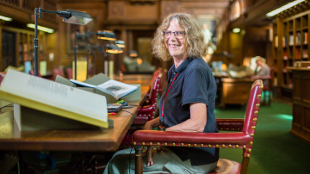 MacArthur Fellow Pamela Long uses historical documents to study the development of science and engineering.MACARTHUR FOUNDATION
MacArthur Fellow Pamela Long uses historical documents to study the development of science and engineering.MACARTHUR FOUNDATION
The MacArthur Foundation this week (September 17) announced its 2014 Fellows—a group of 21 innovators who will receive unrestricted $625,000 “genius” grants to pursue their passions over the next five years. Among the recipients are poets, lawyers, mathematicians, and computer scientists. Three of the winners conduct research with applications to human health, while another aims to understand the origins of science itself.
Materials scientist Mark Hersam of Northwestern University studies carbon nanotubes—cylinders of highly conductive graphene that may enable better batteries and beneficial medical technologies. To isolate uniform populations of nanotubes, a major challenge in the field of nanotechnology, Hersam uses density gradient centrifugation, a technique he adapted from biochemistry.
MacArthur Fellow Tami Bond, an environmental engineer at the University of Illinois, tracks emissions of ...













